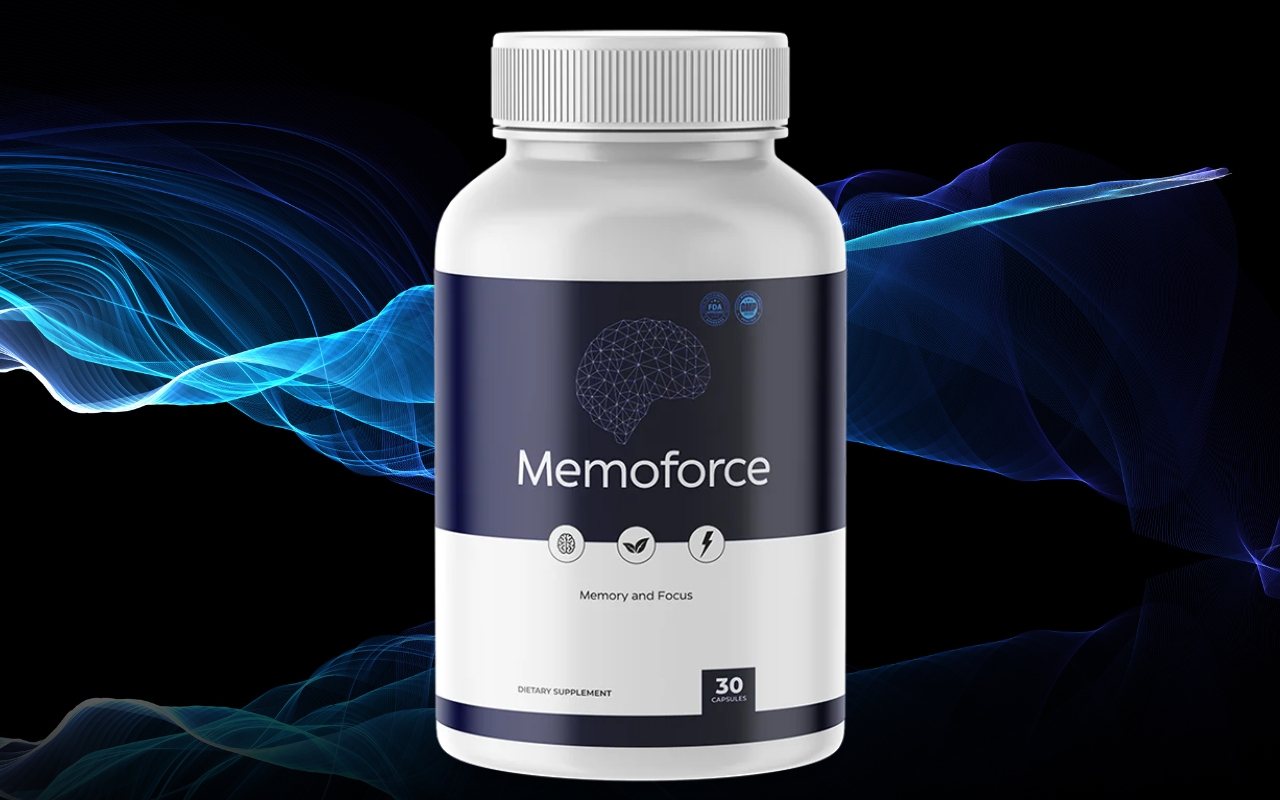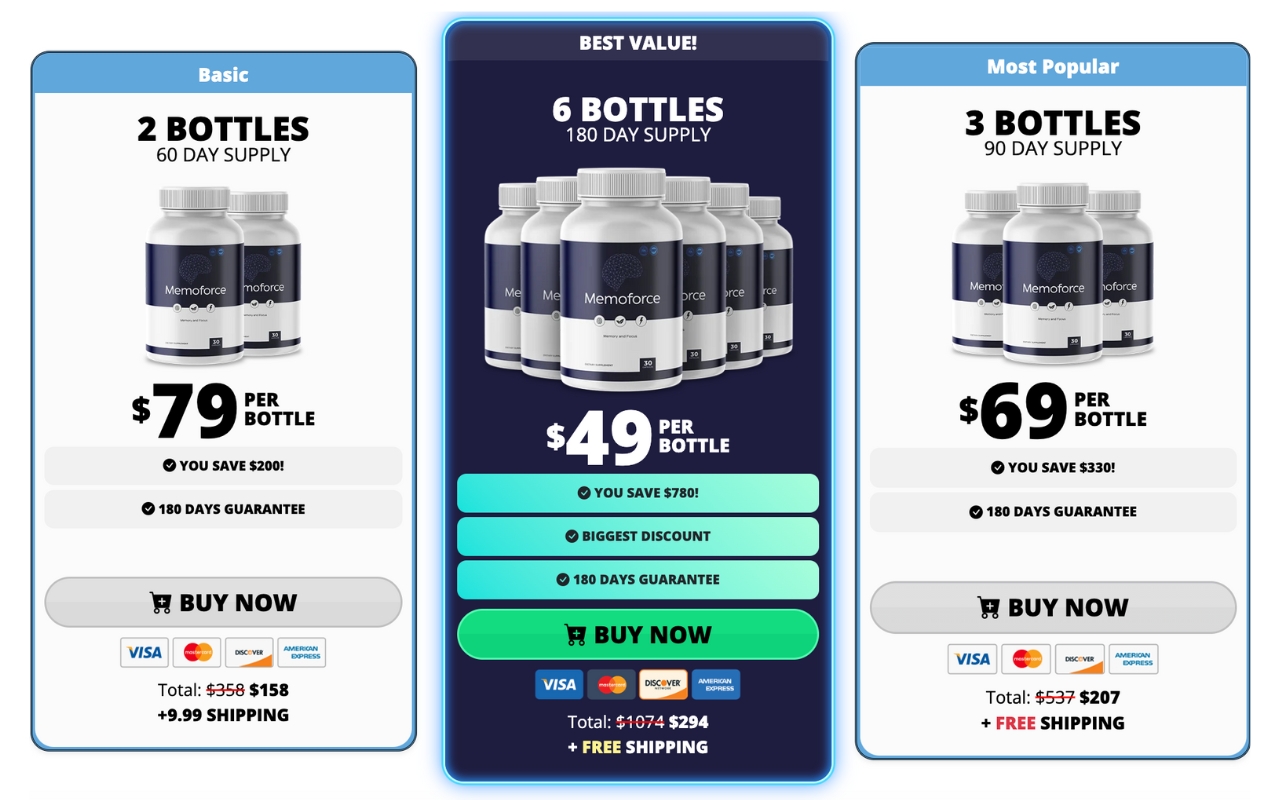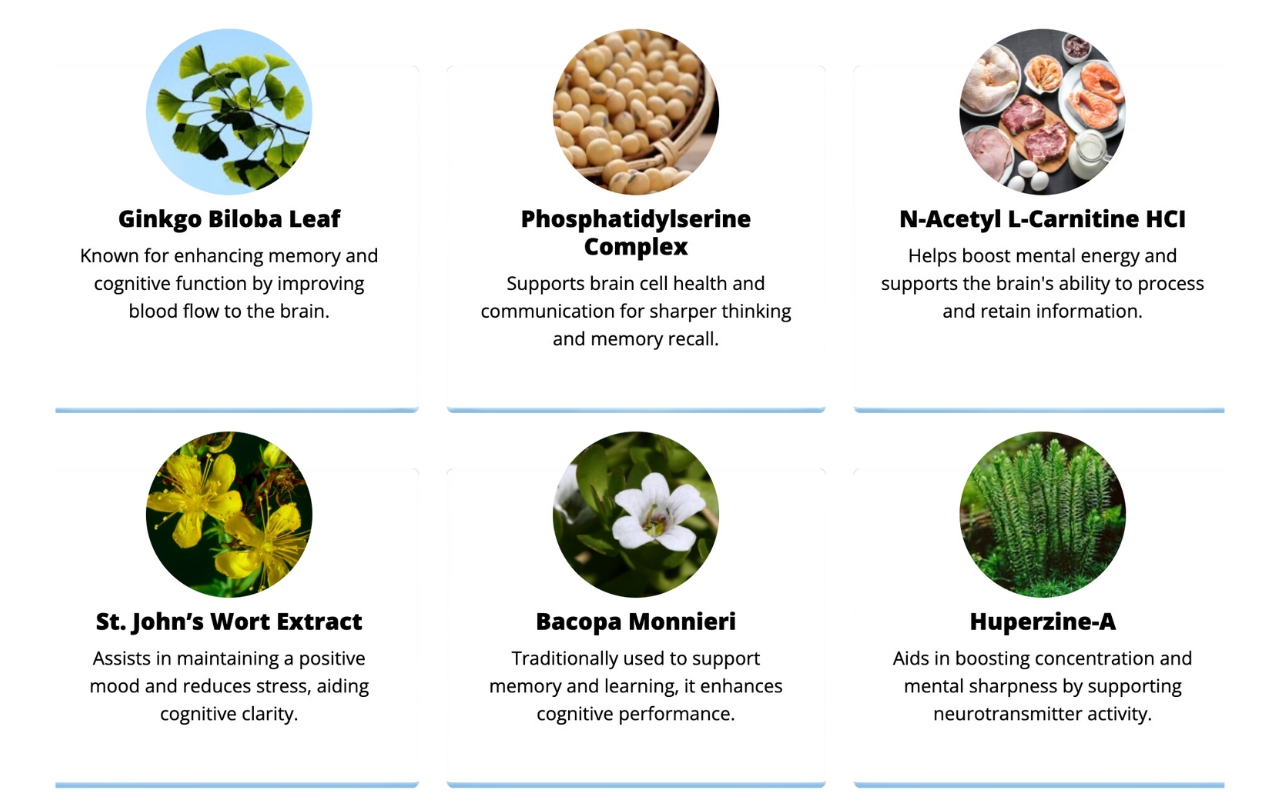
Are you tired of not being able to rely on your memory? Do you find yourself turning to your work notes, even though a lot of the information was learned recently? Most often, sleep deprivation has been found to impair memory retention. With all the information that we process every day, cementing it normally takes a good night’s rest every night. If sleep quality isn’t the problem, one team strongly believes that the absence of certain nutrients combined with chronic neuroinflammation might be deteriorating brain health and eventually cognition. What do they mean by this, and what measures do they propose people implement? This review aims to explore the multiple dimensions of MemoForce.
What is MemoForce?
MemoForce is an all-natural dietary supplement formulated to enhance memory and focus. Its blend of ingredients is believed to work synergistically to improve one’s ability to recall names, dates, and important details. Furthermore, it might promote better mental clarity, reduce brain fog, boost alertness, and protect brain cells from the consequences of excess oxidative stress. The creators strongly believe that this formula can help most people with memory issues, noting that many users have since reported positive changes to their overall cognition. Where does their confidence come from? To answer this, we need to dig deeper into the main ingredients.
Sharper focus starts here—order Memoforce now!
What ingredients are in each MemoForce serving?
Each MemoForce serving contains a precise blend of traditionally celebrated herbs, such as:
Ginkgo Biloba
Ginkgo biloba is a tree native to China. Possessing a rich history in alternative Chinese medicine, its leaves have been used to improve brain function and blood circulation. More recently, research has emerged that showcases ginkgo biloba’s antioxidant profile, anti-inflammatory properties, and many more. Concerning brain health and cognitive function, the same source emphasized that research results are generally mixed. To be more specific, some have reported a reduction in cognitive decline in dementia while others have simply failed to replicate said result.
A 2018 review of four studies, which probably isn’t enough to begin with, reported a significant reduction in several dementia-related symptoms over up to 24 weeks. Older studies have since pointed to ginkgo’s potential contribution to easing anxiety and treating symptoms of mild depression, but once again, more research is still needed. The most recent review dates back to 2020, when researchers investigated cognitive function improvement in healthy people and Alzheimer’s patients taking ginkgo biloba.
After collecting clinical trial reports from several databases since the 1980s, the team did a thorough analysis and comparison, leading them to believe that ginkgo does have some potential. In particular, they believe that it might improve the cognitive function of people suffering from mild dementia over long-term administration (over 24 weeks) at a dose of 240 mg per day. That said, there are more relationships that need to be deciphered to fully understand its role, thereby necessitating further investigation.
Phosphatidylserine Complex
Phosphatidylserine is a fatty substance that protects brain cells. Additionally, it is responsible for inducing communication and survival among these brain cells, thereby promoting cognitive function and memory. Another source that covered the evidence, benefits, safety, and other pertinent information on ingesting phosphatidylserine did mention that long-term studies are lacking. Based on existing evidence, the most recent being a 2022 systematic review and meta-analysis, phosphatidylserine might improve memory and yield marginal improvements in cognition, which aligns with the previous source.
Aside from the lack of long-term investigations, phosphatidylserine supposedly comes in different types, carrying different chemical makeups (i.e., by concentration of DHA and EPA). This makes it extremely difficult to compare results across different sources. A 2022 review that looked at the relationship between phosphatidylserine, inflammation, and central nervous system (CNS) diseases underlined that the fatty acid could be a promising supplementation for neurodegenerative and neurodevelopmental diseases. The latter largely stems from its involvement in cellular death and survival and inhibiting excess neuroinflammation (or inflammation in the brain).
Neuroinflammation, in this case, is described as a “double-edged sword,” stressing that inflammation in the brain is necessary for shielding tissues during repair after injury and removing cellular debris. The other edge, so to speak, is chronic neuroinflammation, which has since been linked to CNS diseases such as Alzheimer’s disease, Parkinson’s disease, strokes, and other brain injuries.
Elevate mental energy and recall with Memoforce!
N-Acetyl L-Carnitine HCL
N-acetyl L-carnitine hydrochloride is a supplement made of the hydrochloride form of salt of the acetylated form of carnitine, writes one source. This supplement has been touted for its potential “neuroprotective, cognitive-enhancing, anti-depressive, and immunomodulating activities.” A 2020 critical update on administering acetyl L-carnitine for people with dementia and other cognitive disorders argued that its benefits are still up for debate but listed several of its underlying mechanisms.
These include restoring cell membranes and synaptic functioning (i.e., junctions where neurons communicate), increasing cholinergic activity (related to acetylcholine activity in the nervous system), promoting mitochondrial energy metabolism, and protecting against toxins. Interestingly, acetyl L-carnitine has been shown to have an effect on the gut-liver-brain axis, demonstrating potential use cases. The researchers believe that homogeneous samples and longitudinal assessments are necessary before large-scale clinical applications.
St. John’s Wort
St. John’s wort is an all-natural herbal supplement that has been considered for its ability to ease symptoms of depression for centuries. Several reviews of studies have previously confirmed that the herb reduced mild to moderate depression more than a placebo and acted similarly to prescription antidepressants. A licensed naturopathic physician explained that the herb acts in several ways to elevate mood in such people, adding that this herb might not be suitable for people with severe depression. Furthermore, it is unclear which of its active ingredients is responsible for the reported benefits, leaving researchers unsure of the underlying mechanism.
For the time being, St. John’s wort is believed to increase different chemical messengers in the brain like serotonin, dopamine, and noradrenaline, all of which might regulate mood. One rat study that looked at the effects of St. John’s wort on cognitive parameters and brain-derived neurotrophic factor (BDNF) levels reported unexpected results. While the herb’s potential as an antidepressant has been mildly celebrated, this rat study reported negative impacts to memory (decreased BDNF levels and poor ability to recognize objects) in certain brain proteins (in both male and female rats). Do these results translate to humans too? More large-scale research is still needed on this front.
Stay sharp at any age—choose Memoforce today!
Bacopa Monnieri
Bacopa monnieri [10], also known as water hyssop, brahmi, or thyme-leafed gratiola, is an herb known for its rich source of saponins (possibly bacosides A and B). Although more research is needed, these chemicals have been attributed to many brain-related benefits. For instance, a meta-analysis found that it might have a positive effect on one’s ability to think logically and remember things verbally (e.g., paying attention, collecting information, and recalling information on demand). Despite these benefits, there is some reason to believe that some results carry bias.
A 2022 study that looked at the effects of bacopa monnieri in younger youths was referenced in this source. By the end of the study, the researchers found that while there was no difference in observed activity levels, those who did take the herb experienced better mood and sleep benefits. Besides improving certain brain aspects in healthy adults, this herb might help those with neurodegenerative diseases such as Alzheimer’s disease and Parkinson’s disease.
In particular, doses of 600 mg daily might help with their symptoms and improve overall quality of life, possibly due to bacopa monnieri’s ability to limit inflammation and prevent the damaging effects of oxidative stress. Finally, there’s reason to believe that this herb might relieve depression or anxiety symptoms, but more research is still needed.
Huperzine-A
Huperzine-A is a chemical extracted from the Chinese club moss (also known as Huperzia serrata). This chemical is renowned for its acetylcholine-like properties, which are critical for increasing ACH levels vital for those with Alzheimer’s disease. Since it has the potential to support brain health, namely, memory, it is treated as a medication in some countries (but not the United States, of course). Generally speaking, huperzine-A might also help with self-care, improve one’s ability to perform daily activities, and possibly ease symptoms of vascular dementia. Unfortunately, the quality of existing studies is somewhat questionable, warranting further investigation.
The most recent randomized double-blind crossover trial found that huperzine-A (at doses of 200 mcg) did not improve cognition during exercise. For this reason, the researchers insist that providers of pre-workout supplements may want to reassess the chemical’s role in the sports industry. Now, 200 mcg sounds fairly low, so will these results be replicated at higher doses? This remains an unanswered question at the time of writing.
Improve memory, focus, and mood with Memoforce!
Frequently Asked Questions (FAQ)
Q. Is MemoForce safe?
A. Yes, according to the creators, MemoForce is safe. Each batch is manufactured in the United States, in a registered facility that is said to have passed rules about safety and cleanliness. Having said that, the creators do encourage talking to a healthcare practitioner before getting started, especially for people who have specific health conditions necessitating medication intake. This is primarily due to the risk of interactions.
Q. Are there any side effects to taking MemoForce?
A. This might vary from person to person. Some herbs have been shown to interact with prescription medication, so individuals will want to do their due diligence before getting started.
Q. How should each MemoForce serving be taken?
A. The recommended serving size is one MemoForce capsule daily with an adequate source of water.
Q. What are the reported benefits of taking MemoForce?
A. When taken as directed, MemoForce might enhance one’s ability to recall information, focus on what matters, support informed decision-making, regulate overall mood, and protect overall brain and cognitive functions.
Q. What is the expected arrival time for MemoForce shipments?
A. MemoForce shipments to the United States will take anywhere between 5 and 7 business days to arrive. Otherwise, the delivery time ranges between 10 and 12 business days.
Q. What if I am not happy with the MemoForce formula?
A. Yes, MemoForce has been protected by a 180-day money-back guarantee. If, within the first 180 days of taking the supplement, individuals find themselves referring to their notes due to their inability to recall information or struggle immensely with focus, customer support can be reached for a full purchase price refund. For more information on the dos and don’ts, jot down the following contact information:
Email: support@getmemoforce.com.
Phone: 1 (833) 685-1388
Return address: MemoForce, 19655 E 35th Drive, Suite 100, Aurora, CO 80011.
Support your brain health with Memoforce daily!
How much does MemoForce cost?
MemoForce is priced according to the number of bottles selected at checkout, each one offering a month’s worth of supply:
- 1 MemoForce bottle: $79 each
- 3 MemoForce bottles: $69 each + free shipping
- 6 MemoForce bottles: $49 each + free shipping

Final Thoughts
Reflecting on the analysis above, it is clear that MemoForce tackles several aspects of overall cognition. Preliminary evidence and historical uses in alternative medicine suggest that the selected ingredients have the potential to improve mood (easing symptoms of mild to moderate depressive symptoms and clearing any clouded judgment and irrational thinking), memory (ability to recall information), daily task completion, and inhibit chronic neuroinflammation and oxidative stress (ultimately protecting brain cells). Tackling cognition from different angles has perks, as it might cover common grounds.
However, individuals need to decide whether they lean on the side of science or tradition. Traditionally, several alternative medicines rely heavily on combining these herbs to enhance cognition, with some countries valuing them as much as prescription medication. From a scientific perspective, more large-scale, human-focused, and quality studies are still needed to understand their foundational effects fully. All in all, there is a lot of promise, but whether this is sufficient will likely vary from person to person.

